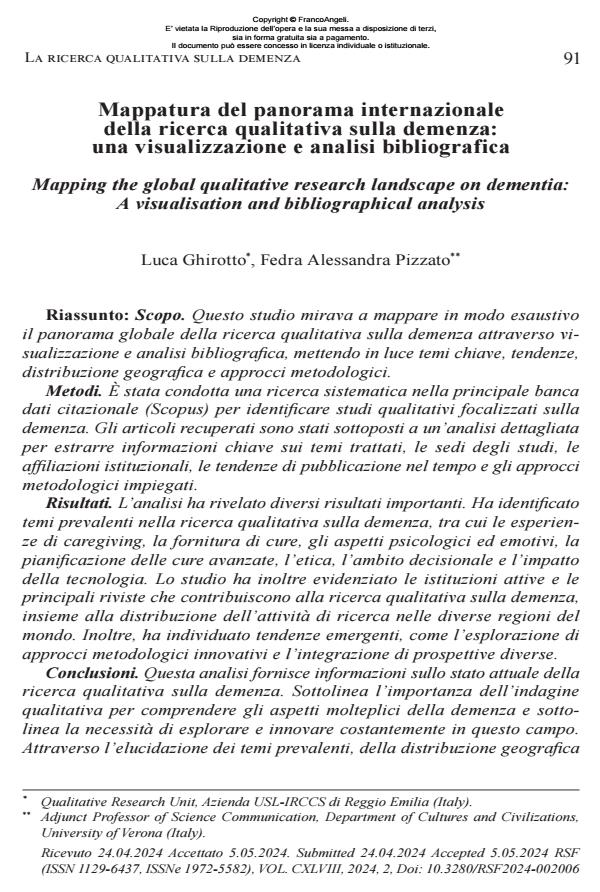Mappatura del panorama internazionale della ricerca qualitativa sulla demenza: una visualizzazione e analisi bibliografica
Titolo Rivista RIVISTA SPERIMENTALE DI FRENIATRIA
Autori/Curatori Luca Ghirotto, Fedra Alessandra Pizzato
Anno di pubblicazione 2024 Fascicolo 2024/2
Lingua Italiano Numero pagine 27 P. 91-117 Dimensione file 402 KB
DOI 10.3280/RSF2024-002006
Il DOI è il codice a barre della proprietà intellettuale: per saperne di più
clicca qui
Qui sotto puoi vedere in anteprima la prima pagina di questo articolo.
Se questo articolo ti interessa, lo puoi acquistare (e scaricare in formato pdf) seguendo le facili indicazioni per acquistare il download credit. Acquista Download Credits per scaricare questo Articolo in formato PDF

FrancoAngeli è membro della Publishers International Linking Association, Inc (PILA), associazione indipendente e non profit per facilitare (attraverso i servizi tecnologici implementati da CrossRef.org) l’accesso degli studiosi ai contenuti digitali nelle pubblicazioni professionali e scientifiche.
Questo studio mirava a mappare in modo esaustivo il panorama globale della ricerca qualitativa sulla demenza attraverso visualizzazione e analisi bibliografica, mettendo in luce temi chiave, tendenze, distribuzione geografica e approcci metodologici. Metodi. È stata condotta una ricerca sistematica nella principale banca dati citazionale (Scopus) per identificare studi qualitativi focalizzati sulla demenza. Gli articoli recuperati sono stati sottoposti a un'analisi dettagliata per estrarre informazioni chiave sui temi trattati, le sedi degli studi, le affiliazioni istituzionali, le tendenze di pubblicazione nel tempo e gli approcci metodologici impiegati. Risultati. L’analisi ha rivelato diversi risultati importanti. Ha identificato temi prevalenti nella ricerca qualitativa sulla demenza, tra cui le esperienze di caregiving, la fornitura di cure, gli aspetti psicologici ed emotivi, la pianificazione delle cure avanzate, l’etica, l’ambito decisionale e l’impatto della tecnologia. Lo studio ha inoltre evidenziato le istituzioni attive e le principali riviste che contribuiscono alla ricerca qualitativa sulla demenza, insieme alla distribuzione dell’attività di ricerca nelle diverse regioni del mondo. Inoltre, ha individuato tendenze emergenti, come l’esplorazione di approcci metodologici innovativi e l’integrazione di prospettive diverse. Conclusioni. Questa analisi fornisce informazioni sullo stato attuale della ricerca qualitativa sulla demenza. Sottolinea l’importanza dell’indagine qualitativa per comprendere gli aspetti molteplici della demenza e sottolinea la necessità di esplorare e innovare costantemente in questo campo. Attraverso l’elucidazione dei temi prevalenti, della distribuzione geografica e degli approcci metodologici, questo studio contribuisce a far progredire la conoscenza e a informare le future direzioni della ricerca negli studi qualitativi sulla demenza.
Parole chiave:Demenza, Ricerca qualitativa, Revisione sistematica, Analisi bibliografica, Tendenze della ricerca
Luca Ghirotto, Fedra Alessandra Pizzato, Mappatura del panorama internazionale della ricerca qualitativa sulla demenza: una visualizzazione e analisi bibliografica in "RIVISTA SPERIMENTALE DI FRENIATRIA" 2/2024, pp 91-117, DOI: 10.3280/RSF2024-002006